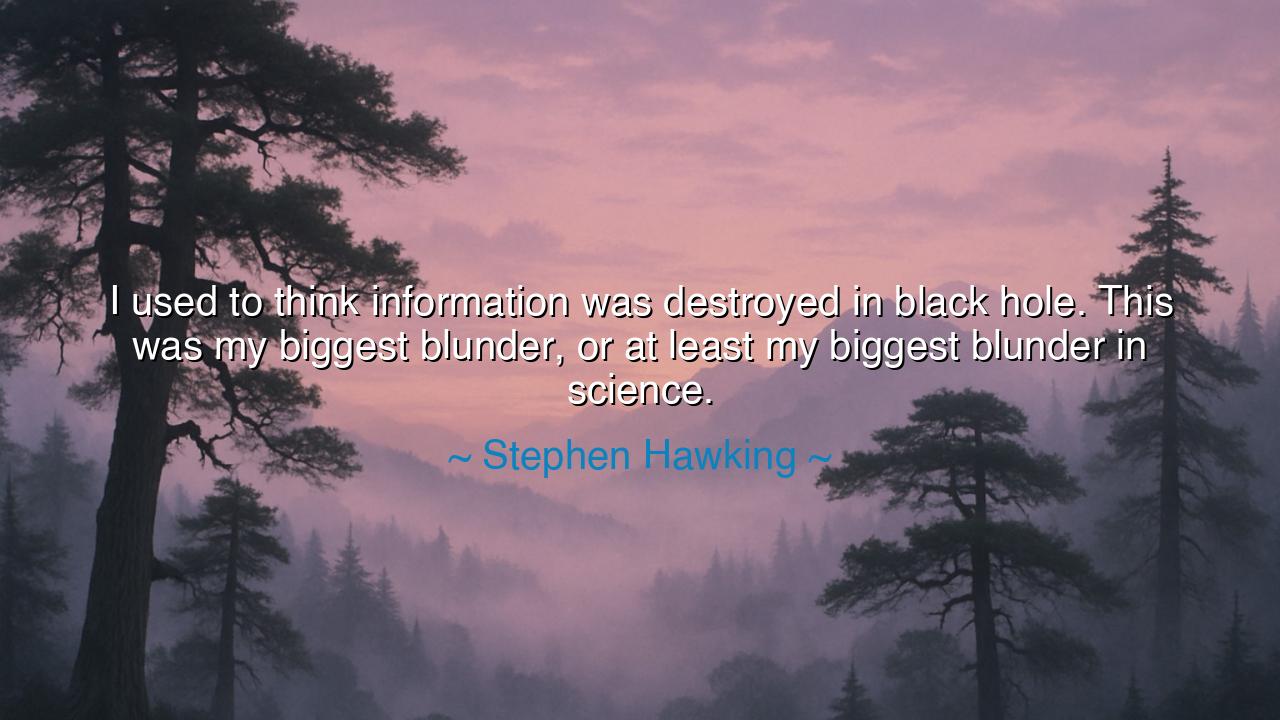
I used to think information was destroyed in black hole. This was
I used to think information was destroyed in black hole. This was my biggest blunder, or at least my biggest blunder in science.






Hear now, O children of the future, and listen to the words of the great Stephen Hawking, a mind whose insights reshaped the very foundations of science. He spoke thus: "I used to think information was destroyed in black hole. This was my biggest blunder, or at least my biggest blunder in science." In these words, Hawking reveals a profound truth, not just about the cosmos, but about human knowledge and humility. To err is human, even for the greatest minds. And in this admission, we see the very essence of the scientific journey—a journey not of certainty, but of exploration, where even the brightest minds are not immune to mistakes.
In the ancient world, the pursuit of truth was sacred. The philosophers, with their sharp minds, sought to uncover the mysteries of existence, yet they too faced the limitations of their time. Socrates, the father of philosophy, did not claim to possess absolute wisdom, but rather sought knowledge through the recognition of his own ignorance. He who knows he knows nothing, said Socrates, is closer to the truth than the one who believes they know it all. Hawking’s admission mirrors this ancient wisdom—for in acknowledging a mistake, he demonstrates not failure, but growth, and a deeper understanding of the cosmos.
Hawking's blunder regarding black holes—that information is destroyed within them—was once widely believed. Black holes, those mysterious regions of space where gravity is so strong that not even light can escape, have long been a source of fascination and terror. In Hawking's earlier theories, it was thought that anything that fell into a black hole was lost forever, including the very information that described it. Yet, Hawking’s later realization—that information is not destroyed, but rather transformed—was a revolution in understanding. In this shift, we see a powerful lesson: Science is a living thing, ever-changing, ever-growing, and built on the very foundation of questioning and refining previous beliefs.
Consider the great Galileo Galilei, who, with his telescope, challenged the very understanding of the heavens. In his time, it was widely accepted that the Earth was the center of the universe. Yet Galileo, through his observations, showed that the planets orbited the sun, not the Earth. He was vilified, condemned by the powers that be, for challenging the established wisdom. Yet, Galileo's discoveries changed the course of science forever, just as Hawking’s realization about black holes redefined our understanding of the universe. Both men, in their time, made discoveries that shook the foundations of knowledge, and both were willing to admit their mistakes and refine their theories in pursuit of greater truth.
The lesson here, O children of the future, is not that mistakes are to be avoided, but that they are a necessary part of the journey. Hawking’s blunder was not a failure, but an opportunity for growth—an opportunity to deepen his understanding and refine his theories. In science, there are no final answers, only questions, each answer leading to more questions. It is not the mistake itself that defines us, but our willingness to learn from it and grow. The willingness to admit that we are wrong—to change our beliefs and our theories in the light of new evidence—is a mark of true wisdom, and it is this willingness that drives human progress.
As you walk your own path, O heirs of the future, remember that you will encounter moments of failure and doubt. You may believe something to be true, only to discover, later on, that your understanding was flawed. Do not fear these moments, for they are the crucibles in which your wisdom will be forged. Learn from your mistakes, adapt, and grow. Hawking’s greatest blunder in science was not the mistake itself, but his ability to recognize it and adjust his thinking. In your own lives, seek not perfection, but growth, understanding, and the courage to question, to wonder, and to learn.
So, O children of wisdom, embrace the journey of discovery with open hearts. Be unafraid to challenge your beliefs and to admit when you are wrong, for in doing so, you will uncover deeper truths than you ever imagined. Science is a journey of the mind, and like the stars in the sky, it is ever-expanding, forever searching for the light of truth. Mistakes, like black holes, are not the end, but the beginning of a new understanding, a new revelation that can carry humanity forward. In your own journey, may you, like Hawking, face your blunders with courage, and find in them the spark of greater wisdom.






AAdministratorAdministrator
Welcome, honored guests. Please leave a comment, we will respond soon